First Wife Swap
 I spend too much time browsing through recently posted Life Photo Archives. I hope they will eventually improve the way it’s tagged, add all the necessary meta-data and more importantly remove what seems to be a limit of 200 results for a search. In the meantime I will post the shots I like for whatever reason.
I spend too much time browsing through recently posted Life Photo Archives. I hope they will eventually improve the way it’s tagged, add all the necessary meta-data and more importantly remove what seems to be a limit of 200 results for a search. In the meantime I will post the shots I like for whatever reason.Pres. John F. Kennedy is sitting with Mrs. Nikita S. Khrushchev.
Pres. John F. Kennedy sitting with Mrs. Nikita S. Khrushchev.© Time Inc. Paul Schutzer While Mrs. John F. Kennedy is talking with Nikita S. Khrushchev.
Mrs. John F. Kennedy talking with USSR Nikita S. Khrushchev. © Time Inc. Paul Schutzer Seems like Khrushchev knew how to entertain a lady.
P.S. If you are one of my younger readers and have no idea who these people are please click here.
Continue reading →Real World War II
May 9th of this year marks the 65th anniversary of the defeat of the fascist Germany or the Victory in Europe Day as it’s known here. In Russia and most of the countries of the former Soviet Union it’s a huge deal, and even for those of us who don’t live there anymore it’s a day of remembrance – every family was touched by the war, lost someone they loved, made unbelievable sacrifices and gave up everything that was asked of them and more to make the victory possible. The War changed the country, changed the people, changed the future, and even 65 years and several generations later it’s still has an effect on who we are.
When I was growing up® the reminders of what happened were all around us. In the seventies many veterans where still in their 50’s and 60’s and frequently visited schools to talk to students and share their memories.
*none of the following photos are mine.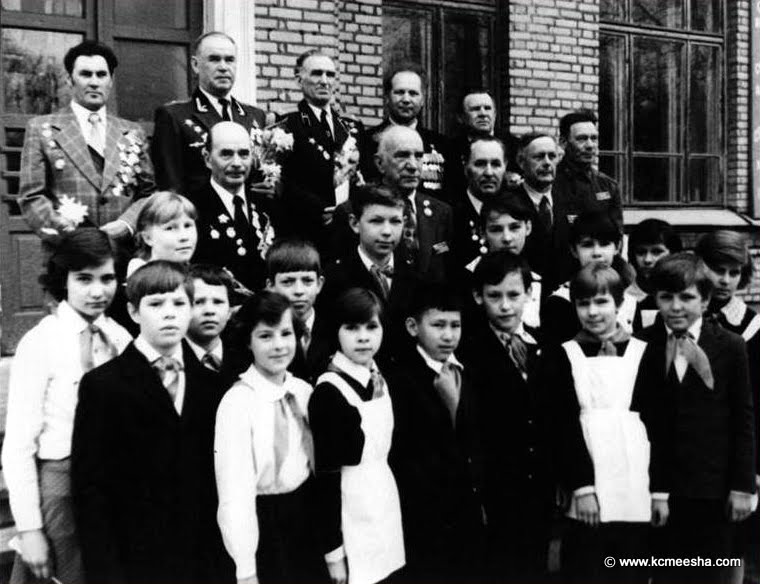
It’s safe to say that we had a cult of the World War II or the Great Patriotic War as we called the events of 1941-1945.
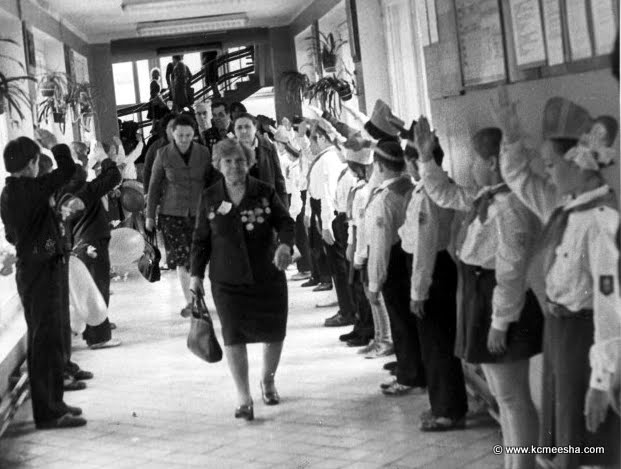
In the songs, movies, books, art, poetry and monumental sculpture the references to the War were numerous and unavoidable.
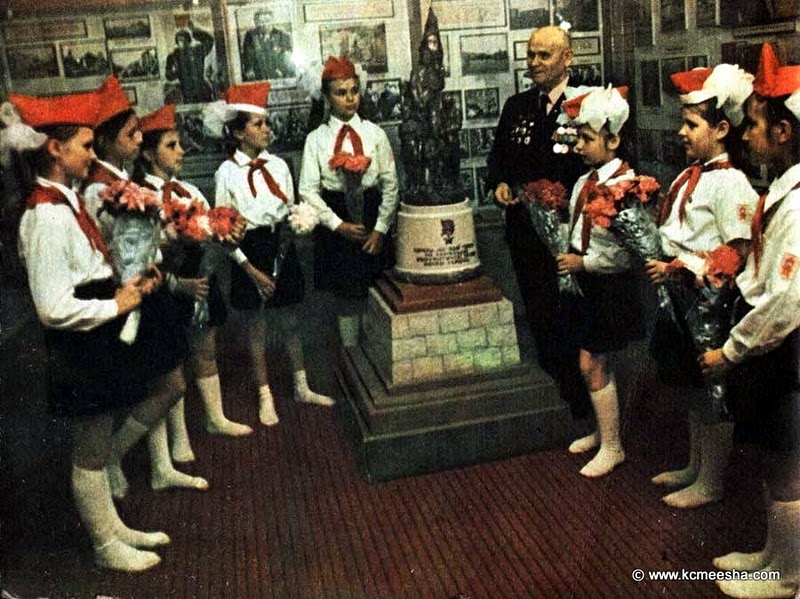
We knew the War heroes and could recite their heroic deeds and acts of self-sacrifice.
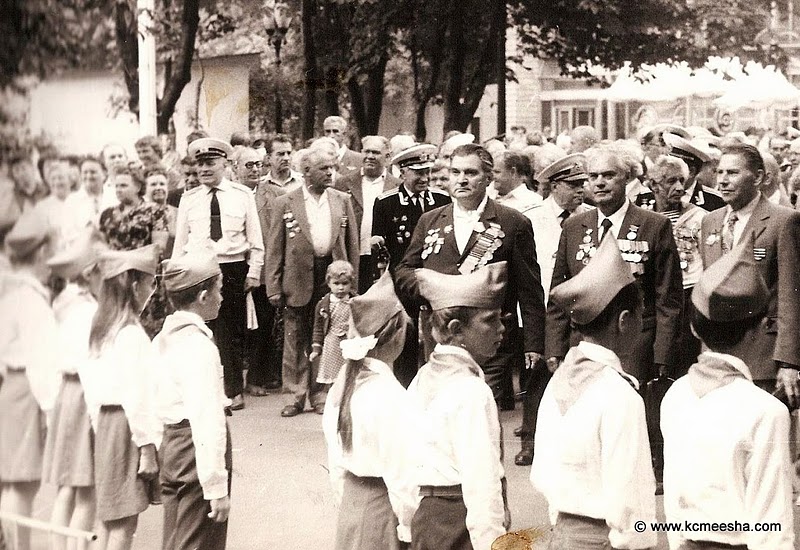
Most of the kids had a veteran or two at home, even more in their building and even more on their block.
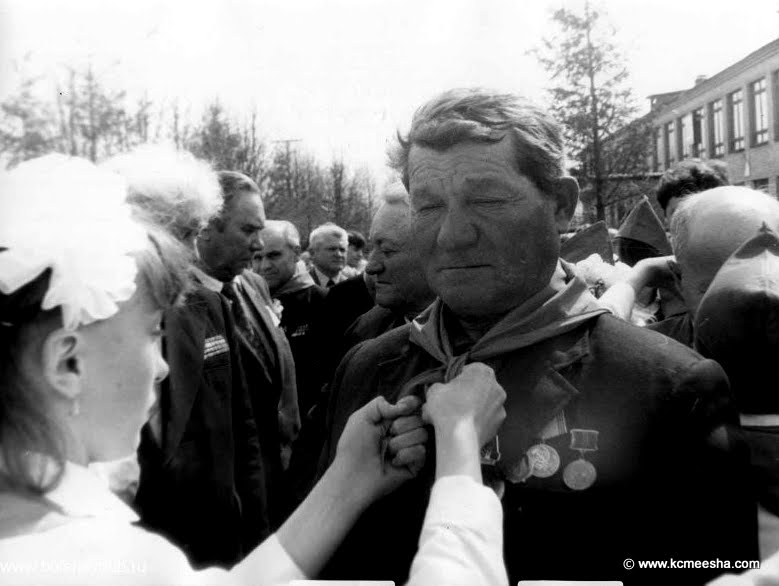
During the school visits and on the holidays they put on their medals and old uniforms to be honored and revered. And revere we did. Those who fought in the War didn’t talk much, even to their own kids, so our knowledge came from the books and movies. There our heroic soldiers under the wise and experienced command of our leaders and Stalin himself fought the evil Germans to rid the Motherland of the invaders. Times where tough but the heroism and the military brotherhood helped them persevere and eventually beat the Nazis raising the red flag over the Reichstag.
Only years later the real information about the War started appearing in the press. Yes, there was plenty of heroism and sacrifice, but there were deserters; talentless cruel commanders who needlessly sacrificed hundreds of thousands of people; there was theft of food and supplies; incompetence; self-mutilations to avoid the front-lines; there was SMERSH – an organization set up to terrorize and interrogate the soldiers and a special troops who were ordered to shoot everyone who retreated; there were looting, cruelty and rape when the troops were in Germany and other liberated countries. Even the flag-raising story and iconic photo of that event were disputed. Some of these could be justified by the war, and some can’t be explained so easily. All these made the Victory a lot costlier in human lives and capital than it ever should have been.
Nothing had shaken my core beliefs about the War like the memoirs of Nikolai Nikulin (this is the only English biography reference of him that I’ve found). Nikulin was drafted in 1941 when he was 18 and served until the end of the War making it all the way to Berlin. I have never read anything so honest and written with so much pain at heart. In 1975, when his memoirs were written, it would have been deemed an anti-Soviet propaganda. It wasn’t published until recent years. The book reads like an indictment of the war crimes committed by the Soviet military leaders, sending their people to die by the hundreds of thousands, without ammo, without equipment, without food, without clothing, without any idea why.
Although the book it not too big, I am not a translator and I realize that not too many people will read this: to those who didn’t grow up like me it’s just trivia. I translated one chapter and will try to translate a few more before the May 9th.
*Bulk-translated with Google, rewritten by me. Names and places are in italics and I tried to link or explain things that may raise questions.
Continue reading →On the night of November 7 (*1941) the bombing was particularly brutal (it was said that Hitler had promised it to the citizens of Leningrad), and the next morning, despite the shelling, we marched to the Finland Station (*railway), where the freight rail-cars took us to the station of Lake Ladoga. We spent the night in the car, literally lying on each other and it was for the best, because the air was twenty below *(-4°F). The only way to warm up was to press against a neighbor. In the morning, on a bomb-damaged pier we were safely loaded onto the deck of an old ship, transformed into a gunboat. Th way across the lake was calm: the sky was cloudy, big waves, stormy. Planes did not fly, but we were freezing in the wind. We were keeping warm pressed against the smokestack. There I made a really good deal, I traded a tightfisted Yuri Voronov three lollipops for half-a-slice of dried bread.
In the snowy New Ladoga we relaxed for day, begging for food everywhere we could from the residents and at the bakery. For the next 24 hours we walked through the dense forest in search of the army headquarters. Some people fell behind, some were frostbitten. At headquarters, we were assigned to various military units. The luck was on the side of those who were assigned to communication regiments; there they operated radios until the end of the war and almost all survived. Worst of all was the assignment to the infantry divisions.
– Oh, you are trained radio operators – they were told – here’s a rifle, there is the height occupied by the Germans! The task – to capture the height!
Newly-trained radio operators died on nameless heights. My fate was different: the regiment of heavy artillery. We searched for it a week, wandering around the front-line villages. Twice we crossed the frozen Volkhov with a huge power plant. We ate what God sent us. Something snatched from employees Volkhov dining room. They were preparing for the evacuation and food theft was rampant. This was done so openly and shamelessly that the person in charge felt awkward to refuse our humble request for food. On another occasion, on the outskirts of the village Voibokalo (it was wiped out in a matter of days), kindhearted young girl brought us leftover cheese cakes and other delicious fare: a big boss – a sergeant was stationed at the house, he didn’t finish his breakfast in the morning .
We slept wherever we could find a place to stay. We spent the night in an empty room at the railway station Volkhov-2 (it was still intact). Here we met a group of armed men in civilian clothes. It was a detachment of guerrillas, who were sent to operate behind the German lines. The next night we slept at some old lady’s house on the brick stove. In the town of Volkhov the breath of war once again touched us. Late in the evening we were passing a school, converted into a hospital. In the corner of the garden, next to the road, two elderly medics buried the dead. Slowly they dug a pit, rid the dead of their uniforms (instruction prescribed to protect the public property). A corpse with a hole in his chest was a divinely beautiful boy. Tight muscles, perfect composition, an eagle tattooed on his chest. On the right shoulder he had a tattooed inscription: “I love nature”, on the left: “Still hungry”. These were the guys from the Marine reconnaissance teams. The first time their brigade fell under Ligovo, then it was re-staffed and sent to the Volkhov front, where she soon bled … Orderlies pushed the bodies into a pit and covered with frozen dirt. We looked at each other and went on. (Later in the summer, I saw corpses being covered in lime – in order to avoid disease, but only a few were buried, those who they managed to pull out from under fire. Usually, the body rotted where the soldier met his death.)After meandering for a long time, risking getting into the hands of the advancing Germans, or being identified as deserters, we reached the station of Murmansk Gates. There some young, rosy-cheeked Red Army fighters in the well-made sheepskins told us that they serve in a regiment just like the one we were looking for and our regiment was impossible to find it somewhere near Tikhvin. They suggested we needed to ask to join their regiment. The administration, in the person of Captain by the name of Sedash, took us in warmly and ordered to enroll in the second battalion of the regiment. This Sedash, a tall brawny fellow, bald, smiley, smoked long self-rolled cigarettes and was unparalleled master-swearer. He was a capable officer, who had just graduated from the Academy, and ran a well-organized regiment. Suffice it to say that in the August fighting near Kirishi, when the infantry was partially scattered and partially surrendered, raising up a bayonet with white underwear, the Sedash’s regiment with their firepower stalled a German advance for a few days. Soon after this action the regiment became Guardian (*a military honorary distinction). Sedash later became a colonel, successfully commanded artillery division (Narva and Novgorod in the early 1944), but never made a general – he was rumored to have been implicated in illegal machinations with food. In 1945, he was seriously wounded near Budapest.
The irony of fate! I was always afraid of loud noises, could not bear a noisemakers and fireworks, and landed in the heavy artillery! But it was good fortune, because in the infantry during active fighting a man remained alive for about a week on average. Then he was bound to be killed or injured. In the heavy artillery this lifespan increased to three or four months. Those who were operating the mortars managed to remain intact throughout the war. After all, a mortar sits way behind the front lines and fires from a protected position. However, mostly older soldiers were assigned to these jobs. Young people, including myself, were assigned to direct the mortar fire. Our place was at the forefront. We had to observe the enemy, direct fire and communicate. I was responsible for the radio communication. We did not have to go into the attack, we usually followed the infantry. Therefore, our losses we not as extensive. My regiment was preserved in its original composition from the time of formation, while the infantry divisions changed their soldiers over and over again, retaining only the numbers. All this I learned later. In the meantime, I was given 300 grams of bread (*.66 lbs), lean soup, and my old boots I still had from Leningrad were replaced with a mismatched pair of valenki.
Just a day after our arrival the food rations were cut because the Germans took over Tikhvin and supply lines were disrupted. People here were just becoming accustomed to hunger, but I already looked like a dystrophic and stood out among other soldiers for my pitiful appearance. Everything was strange for me, everything was difficult: to stand in the thirty-degree frost (-22°F) for four to six hours each night, to dig the frozen ground, to carry heavy logs and shells (a case – 46 kilograms (*101 lbs); all of this without any preparation. I had no strength and lots of anguish. Everyone around me was a stranger, everyone cared only about themselves. Compassion did not exist; instead I was surrounded with swearing, brutality and callousness. Instantly I became utterly lice-ridden – tiny dots were running by hundreds not only in the underwear, but the top of my winter coat as well. Fat louse with a cross on the back was called a “KV” – in honor of the heavy tank of the same name, and the soldiers forgot that the tank was named in honor of the great general Voroshilov. I grabbed those KV’s by a handful from my armpits and poured them in red-hot furnace, where they burst with a loud click. Over time, I scratched my sides bloody, and later they got covered in scabs. There was not even a mention of bathing since we lived on the snow in the cold . We didn’t even have spare clothes. Special powder against lice did not have any effect on them. I tried to soak my clothes in gasoline and put them on this way. Tiny lice escaped and I could shake them off from my neck. But the next day they reappeared in larger quantities. Only in 1942 we got the remedy “Soap-K” , a yellow, terrible smelly paste, we had to boil our uniforms in it. Then we finally breathed a sigh of relief. By that time we also learned to build bath.
And yet, I was lucky. I was a lousy soldier. In the infantry I would’ve been immediately shot to make and example, or I would have died on my own from weakness, falling head first into the fire; many charred corpses remained on sites where the starving troops who recently arrived from Leningrad were stationed. In the regiment I was probably despised but tolerated. I cut dozens of cubic meters of firewood for the officers’ dugouts, carried out any work, froze at the post. Occasionally, I carried out the duty near the radio-station. They’ve never sent me to the front lines and luckily we didn’t have any big battles. In short, I did not immediately hit the meat grinder, and had the opportunity to get used to military life gradually.The shelling did not initially frighten me. I just did not realize what was happening. Crash, people falling and moaning, splashing blood on the snow and I just stood there blinking my eyes. Often someone knocked me off my feet cussing me out so I don’t stand in the open. But the shrapnel and stray bullets missed me so far. I soon found my calling – I rushed to the wounded, bandaging them, and although I had no experience, everything turned out well – surprising even professional medics.
In the late November, we started our attack. Only now did I discover what war was, although I still didn’t have to participate in the attacks. Hundreds of wounded, dead, cold, hunger, stress, a week without sleep … In a relatively quiet night, I sat in the snow pit, unable to sleep from the cold. Scratching lice-ridden sides I wept with grief and weakness. That night there was a change in me. From somewhere came the force. In the morning I crawled out of the hole, searched the deserted German dug-outs, found frozen like a stone potatoes, made a fire and cooked the stew in a helmet, filled my belly and felt confident. From then on began my rebirth. There were defensive reactions, there was energy. There was a new sense, telling me how to survive. There was grip. I began to procure some grub. Once I used an ax to chop horse meat from the thighs of dead German draft horse, it was frozen solid. I found an abandoned potato pit. Once a mine killed a passing horse. After twenty minutes all that remained was only mane and the reins, as craftsmen like me instantly cut the meat into pieces. The driver did not even had time to recover, and remained sitting in the sleigh with the reins in his hand. Another time we were marching along the road and suddenly a shell hit the kitchen. Buckwheat porridge poured on the snow. Instantly, without saying a word, everyone took a spoon and began a feast! But traffic on the road can not stop! A hay-wagon and a truck drove through the porridge but we kept eating until there was nothing left… I collected the crumbs and dried leftover bread around warehouses and kitchens – in short I got food wherever I could.
The offensive continued, at first successfully. The Germans fled, abandoning their guns, cars, all sorts of stores, shot down the horses. I realized that the stories of their atrocities were not an invented by the journalists. I saw the burned corpses of prisoners with carved stars on their backs. Villages on the German escape routes were all destroyed, the people driven out. There were only few of them left – hungry, ragged, wretched.I was now being sent to the front line. I remember the hellish fire, crawling on the bellies in the snow. Blood, blood, blood. In those days I was injured for the first time, though the wound was not serious – just a scratch. It happened like this. At night, exhausted, we came to an abandoned school building. Empty classrooms were warmer than the snow, there was straw and some soldiers slept on it. We lied down beside them and immediately fell asleep. Then someone woke up and saw that we were sleeping next to the Germans! Everyone jumped up in the darkness and there was shooting, noise, screams, groans, curses. Everyone was fighting everyone in the confusion of darkness. I got hit in the thigh with a bayonet and hit someone with a knife, then all fled in different directions, clanging teeth, we were all hot. I took off my pants and identified the shape of the scar with a German flat bayonet . I didn’t go to the infirmary, the wound healed itself in two weeks.
Near the front lines it was easier to get some grub. At night you can crawl on the neutral zone, cut backpacks from the dead and find food in them – dried, canned, and sometimes sugar. Many have done so in moments of calm. Many have not returned because the German machine-gunners were not dozing. One day a sergeant, apparently drunk, drove in a sleigh in the neutral zone, where he and his horse were immediately killed. And in the sleigh there was food – bread, canned food, vodka. Immediately there were volunteers to save these treasures. First two crawled and were killed by the bullets, and then another three. No one volunteered after that. The same night I took another shot at it. Realizing that the Germans shoot at even the tiniest noise, I decided to take nothing with me but only cut the harness and tethered the sled to a phone cord and safely returned to the trench. Then – one, two,pull! – We pulled the sleigh. All products were riddled with bullets, vodka leaked, but we still managed to have a feast!
Near the railroad Mga – Kirishi our offensive died down, and the Germans held a strong position. There used to be a large village here, from which there is no longer even a trace, I met the New Year 1942. Late 1941 was marred by an ugly episode. About three days before the commanders of our battalion received orders to get behind the German lines through the gap in their defense and from there to call in mortar fire. In a terrible cold, the deep snowdrifts, among virgin forest we walked 20 kilometers (*12.5 miles) on skis. Rockets, shedding light on the front line, were left behind. The moon was bright. We walked between the huge fir trees. Finally, the clearing revealed the dugout, left from the summer. We decided to have a rest and get warm. At dawn suddenly someone yelled: – Germans!
I was in the dugout and reacted late. In the light of day, I saw no one, and only in the distance, in the forest, flashed the silhouettes of my fleeing comrades. I just walked after them. Under the tree I was met by a terrified lieutenant with the gun at the ready.– Where are the Germans?
– I do not know, I did not see any …It turned out that there was panic, everyone ran, and the bosses before anyone else. It would’ve been fine but in the heat of the escape we have forgotten radio. And I didn’t even know! We decided to go back. But now it turned out that the Germans really have taken our place. Gunfire started, and we withdrew empty-handed. The radio was lost, the order is not executed. Before the New Year there were repressions. The investigator arrived and questioned all involved. They found a scapegoat – a person responsible for the radio, a likable sergeant Fomin. Then followed a tribunal – a show-trial with a predetermined ending. The decision, however, was better than we expected – Fomin and another soldier who stole the honey from a civilian, received ten years in prison to be served after the war. Bardanosov (caught stealing honey) soon redeemed himself: a bullet pierced his lung; I don’t know if he survived. Fomin lived long and I am guessing was later rehabilitated. But on the New Year’s Eve we all felt horrible. After returning from the front, I fell asleep in the warm dugout, slept past midnight and have not even heard the shooting which was going on all around me.
Soon we left Nahody – the last village I had seen until mid-1943. The regiment was moved to a swampy undergrowth near the station Pohost. Everyone thought that the delay is temporary, it may take two or three days, and we move on. But fate decided otherwise. In these swamps and forests, we’re stuck for two whole years! And all we have experienced until then – was just flowers, berries were still to come!
Things You Probably Never Heard Of: Eurovision 2009
In the country where the “World Series” usually include such world powers as New York and Arizona, it’s no wonder that a musical competition in Europe is not front page news. I feel it’s my duty to inform those of you who haven’t heard the news that this year’s Eurovision 2009 was won by a Russian-born singer representing Norway.
httpvh://www.youtube.com/watch?v=fBFFlL58UTM
I actually had more fun watching the compilation of all the winners in the previous 50 years where many songs sounded very familiar.
httpvh://www.youtube.com/watch?v=4G0eiFxEiIU
While you may want to take a look at poodle-looking Celine Dion somehow representing Switzerland, I like the following song from 1975 a lot better.
httpvh://youtu.be/5fG09fmsQB8
Continue reading →Russian Gourmet: Pickles
This post is about pickles. Not your regular brownish-green vinegary mouth-puckering pickles. It’s about bright-green, crunchy, slightly salted pickles that taste fresh, slightly garlicky and with a hint of dill – pickles of my childhood. The closest thing to these that can be found in your regular grocery store is the Claussen Pickles but they are a far cry from the real thing. Rarely you can find excellent Ba-Tampte Half Sours usually in the kosher refrigerated section. For a better version head on to the Russian Store, they are sold by weight at the counter (grab yourself a couple of pickled apples and tomatoes while you are there).
Sometimes you can find a pickling spice mix at a Russian store, or if you have friends who will smuggle it for you illegally from Eastern Europe.

In the absence of pre-made spice mix I always use dill weed (fresh or dry) or dill seed, lots of garlic, some black peppercorns, maybe a hot pepper (be careful how hot), if you have cherry leaf or two, a horseradish leaf (which I’ve never seen sold here) and a few bay leaves.
Yesterday after a downtown lunch I stopped by the City Market and bought about 5 lbs of fresh pickling cucumbers.
These are not gigantic-looking things sold in Wal-Mart, they are small, light-green,bumpy and crunchy. In this area they are available only during the summer. I brought them home and soaked them in the kitchen sink to let all the dirt come loose. I also cut the ends off and pierce the cucumber with a knife in the middle. This way the brine has more surfaces to penetrate the cucumber.

From there on the process is simple – wash the cucumbers and put them in the jar, adding garlic and spices at the same time. The hard part is to guess the amount of salt. The general rule of thumb is 1 tablespoon of salt dissolved in 1 liter (quart) of warm water, I think it has to be a regular tablespoon heaping with salt. Lately I’ve been using 2 measuring tablespoons of salt per quart of water.It doesn’t have to be extremely salty, maybe slightly saltier than you’d like to taste. The whole point is to keep the fresh taste and crunchiness and not to over-salt the pickles. Fill the jar to the top, cover and leave on the counter. You can start tasting the pickles the next day or two. When they reach desired taste, place them in the refrigerator.

They are good with any food or drink, a hot dog, a sandwich, a shot of vodka or just by themselves.

They are good when you are eating with great friends…
…or when you it’s just you, pickle and this song….
httpvh://youtu.be/g266Uwp6ZnI
Continue reading →Rogers, AR Spits On Funk’s Front Porch
Being my own awesome tipster I took this picture of the billboard recently placed around 17th and Jefferson facing the southbound traffic on the I-35.
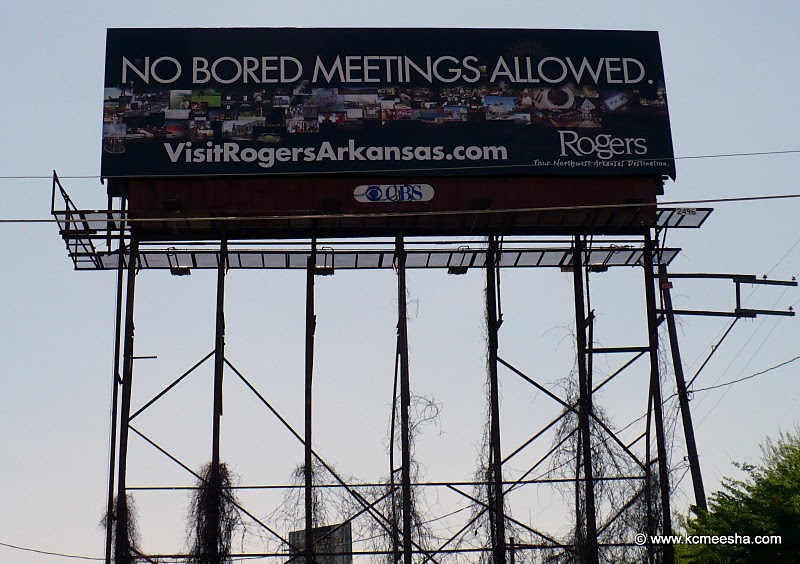
Not only this billboard is in direct view of the few coveted Kansas City visitors who are probably attending one of the “bored meetings”; Mayor Funky himself can probably see it from his vantage point high atop the City Hall. City of Rogers, AR is poaching guests straight from the Funk’s Front Porch.It’s not unusual to see signs like this on the highways but they are mostly located in the middle of nowhere so a person may be convinced to visit a city down the road. But as any tipster with a map knows – Rogers is not on I-35; in fact I-35 doesn’t even pass through Arkansas.
The fact that this billboard wasn’t burned down to the ground by the few remaining employees of the Kansas City Convention and Visitor Bureau shows a complete ineffectiveness of the Funky Administration and is probably somehow racist, but I am still working on this part.
Visit Rogers, it’s only 218 miles away on a different highway!
Continue reading →